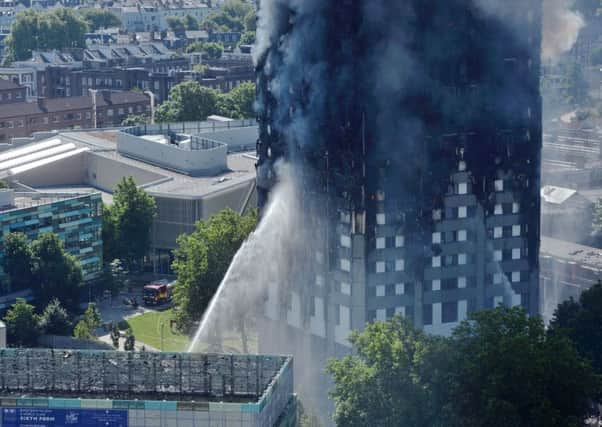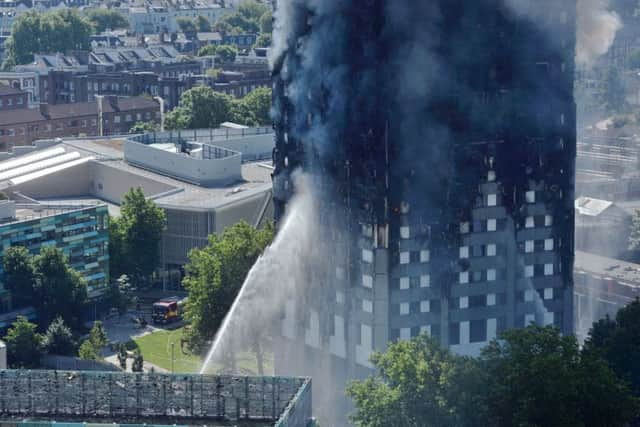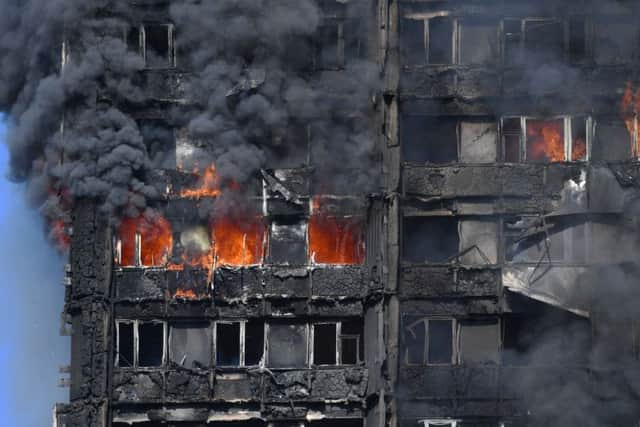Grenfell Tower: Police say '87 recoveries' have been made


Commander Stuart Cundy, who is overseeing the Metropolitan Police response to the fire, said “87 recoveries” had been made, but stressed “the catastrophic damage” inside meant “that is not 87 people”.
Some 21 bodies have been formally identified by the coroner and their families informed.
Advertisement
Hide AdAdvertisement
Hide AdSpecialist officers have begun “meticulously” sifting through about 15.5 tonnes of debris on each floor by hand for any human remains still within the tower, he said.


Of the operation, one of the largest and most complex in the Met’s history, Mr Cundy said: “Tragically, there are still 23 flats where despite our investigative efforts we have been unable to trace or speak to anyone who was in those properties on the night.
“We assume that sadly no-one from any of those flats survived.”
He said he did not want there to be any “hidden victims” but was unable to say “with any certainty” how many people may have been in those flats, either as occupiers or visitors, until the search was complete.


It comes as most survivors displaced from Grenfell Tower and Walk are still living in hotels three weeks after the deadly blaze as the Government attempts to find them suitable accommodation.
Fourteen households hoping to be moved out of emergency accommodation have accepted offers for permanent or temporary living arrangements, Grenfell Response Team (GRT) said.
It also emerged a specialist taskforce will be sent in to Kensington and Chelsea Council to take over the running of key services, following heavy criticism of its response to the disaster.


Campaigners and residents claim little headway has been made, with residents said to have been offered properties that are either out of the borough, too expensive or on a one-year contract.
Advertisement
Hide AdAdvertisement
Hide AdSome 139 offers had been made following 158 housing needs assessments by Wednesday, the three-week deadline the Government set itself for offering housing to all of those displaced by the blaze.
GRT said every household that wanted to move from emergency accommodation had been made offers in Kensington and Chelsea or neighbouring boroughs, while 19 families were contacted and had either refused assistance or were abroad.
This was for a range of reasons, including some relatives who were looking after loved ones in hospital, and the response team was “ready to provide them with accommodation when they were ready”.


One resident reported being shown a two-bedroom property when they required three bedrooms, others had been offered places in high-rises, and another survivor was said to have been offered accommodation with the caveat that no guests could stay overnight.
GRT has said rent will be suspended for one year and thereafter will be of a “similar scale to a council house social rent”, while survivors should feel under no pressure to take up the first offers.
Grenfell survivor Sid-Ali Atmani, currently living in a hotel, turned down the offer of a home because it was too far from the area and the local school.
He told the BBC Radio 4 Today programme: “Some families ... they don’t want a temporary house.
“Personally, I speak with a few families, they are not asking for a temporary house.
Advertisement
Hide AdAdvertisement
Hide Ad“Can the Government give them back their houses, their life back?
“We are not the criminals here, the crime has been happening in the building.”
Most Grenfell Tower survivors are still living in hotels three weeks after the deadly blaze as the Government attempts to find them suitable accommodation.
Fourteen households hoping to be moved out of emergency accommodation have accepted offers for more permanent living arrangements, Grenfell Response Team (GRT) said.
Campaigners and residents claim little headway has been made, with residents said to have been offered properties that are either out of the borough, too expensive or on a one-year contract.
It also emerged that a specialist taskforce will be sent in to Kensington and Chelsea Council to take over the running of key services, following heavy criticism of its response to the disaster.
Some 139 offers had been made following 158 housing needs assessments by Wednesday - the three-week deadline the Government set itself for offering housing to all of those displaced by the blaze.
GRT said every household that wanted to move from emergency accommodation had been made offers in Kensington and Chelsea or neighbouring boroughs, while 19 families were contacted and had either refused assistance or were abroad.
Advertisement
Hide AdAdvertisement
Hide AdThis was for a range of reasons, including some relatives who were looking after loved ones in hospital, and the response team was “ready to provide them with accommodation when they were ready”.
One resident reported being
